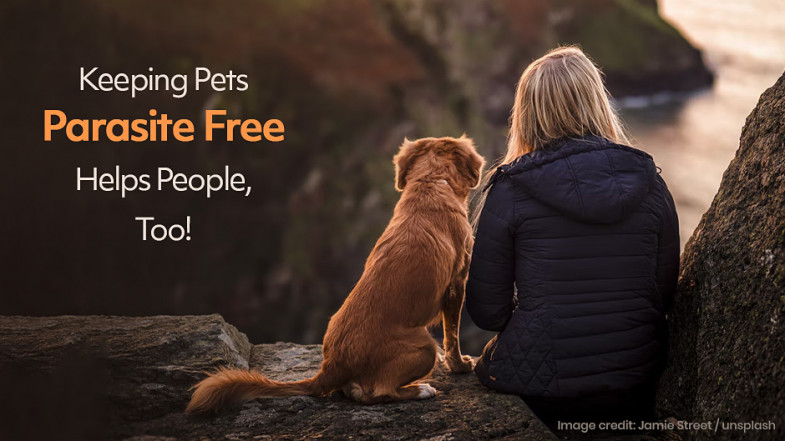Turner Veterinary Clinic News
Keeping Pets Parasite Free Helps People, Too!

While parasite prevention is essential for your pet’s health, it can also play a critical role in keeping you and your family safe. Some of the parasites that affect pets can be spread to people.
In this article, we’ll discuss which parasites could be a risk to you and how to keep you and your pets parasite free.
Zoonotic Parasites
While many parasites can affect pets, zoonotic parasites can be transmitted from pets to people. Below are a few of the most common zoonotic parasites and what you need to know about them.
- Tapeworms
The most common zoonotic tapeworm is known as Dipylidium and is found in both dogs and cats. While you can not get this tapeworm directly from your pet, it can be spread by fleas. While it may seem unlikely that you would eat a flea, it can happen accidentally and is most commonly seen in children.
- Hookworms
Hookworms are another intestinal parasite that you can contract from your pet. Hookworm eggs can be excreted in your pet’s feces and live in the soil for long periods of time. When your skin comes in contact with contaminated feces or soil, the hookworm burrows into your skin. The infected area may become red and is often quite itchy.
- Toxoplasma
Toxoplasma is an intestinal parasite that is spread to humans through contact with cat feces. Symptoms of toxoplasma infection in people can vary but are usually mild and resemble the flu. However, pregnant women who become infected with Toxoplasma can spread the infection to their unborn children.
Keeping Your Pets Parasite Free
One of the most critical steps in keeping you and your pets safe is parasite prevention. Parasite prevention comes in various forms, including topical treatments, oral medications, and injectables. Some preventatives can protect your pet from multiple parasites. However, it’s essential to ensure your pet is fully protected from fleas, ticks, heartworms, and internal parasites.
If you have questions about your pet’s level of protection, our team is happy to provide recommendations and help make sure your pet is adequately protected.
In addition to preventative care, parasite testing is also critical. Fecal tests can detect intestinal parasites and are recommended during your pet’s annual wellness exam. You should also monitor your pet for any concerning symptoms such as weight loss, diarrhea, or excessive itch.
Reducing Your Risk
While keeping your pet parasite-free is critical, some additional measures can help reduce your risk. Always wash your hands before eating and after handling your pet. When your pet uses the bathroom, clean it up as soon as possible and always dispose of the waste properly.
Because of the increased health risks associated with Toxoplasma infection during pregnancy, the CDC recommends that pregnant women avoid cleaning their cat’s litter box when possible. Instead, ask another family member to help you with the task. If this is not possible, wear disposable gloves and wash your hands thoroughly when you are done.
Final Thoughts
Not only can parasite prevention protect your pet, but it can also help you! In addition to using parasite prevention, remember to be careful when cleaning up after your pet and always practice good hygiene.
If you have additional questions about keeping your pet parasite free, please give us a call. We are happy to set up an appointment to check your pet for parasites and discuss their preventative care.
Categories
Recent Posts

When was the last time your pet saw the veterinarian for a checkup, not because they were sick, but just to stay healthy? Preventive care is one of the most important ways to give your pet a longer, happier life. It’s not about doing one big thing. It’s about the small, consistent steps that help avoid bigger health problems later on.

The holidays are full of sparkle, laughter, travel, and to-do lists a mile long. As joyful as this season can be, it often means busier schedules and less time for everyday routines. In the middle of the holiday rush, it's easy to overlook one very important family member: your pet.

If you're lucky enough to have a senior pet, you know just how special that bond becomes over time. From cozy afternoons on the couch to the look in their eyes that says, "I've known you forever," there’s a deep and quiet understanding between you. As pets get older, though, their needs change. Aging isn’t a disease, but it does require us to adapt how we care for our beloved companions.
The good news? With the right care and attention, senior pets can enjoy happy, healthy golden years. Here are seven simple but meaningful health tips to help your older dog or cat feel their best.

Has your dog seemed a little more reserved lately, or is your cat less interested in playing with their favorite toys? It can be easy to attribute these changes to aging or mood, but pets are experts at hiding discomfort. The good news is that there are plenty of subtle signals that can provide clues that your pet may be experiencing pain, and many treatment options to help alleviate this discomfort.

Did you know that pets accidentally start nearly 1,000 house fires every year in the United States? It’s a scary thought, but it doesn’t have to be a reality in your home. Our furry companions are naturally curious and love to explore their surroundings, but sometimes their adventures can put them, and your entire household, at risk. The good news? With a little awareness and a few easy changes, you can protect your pets and keep your home safe from fire hazards